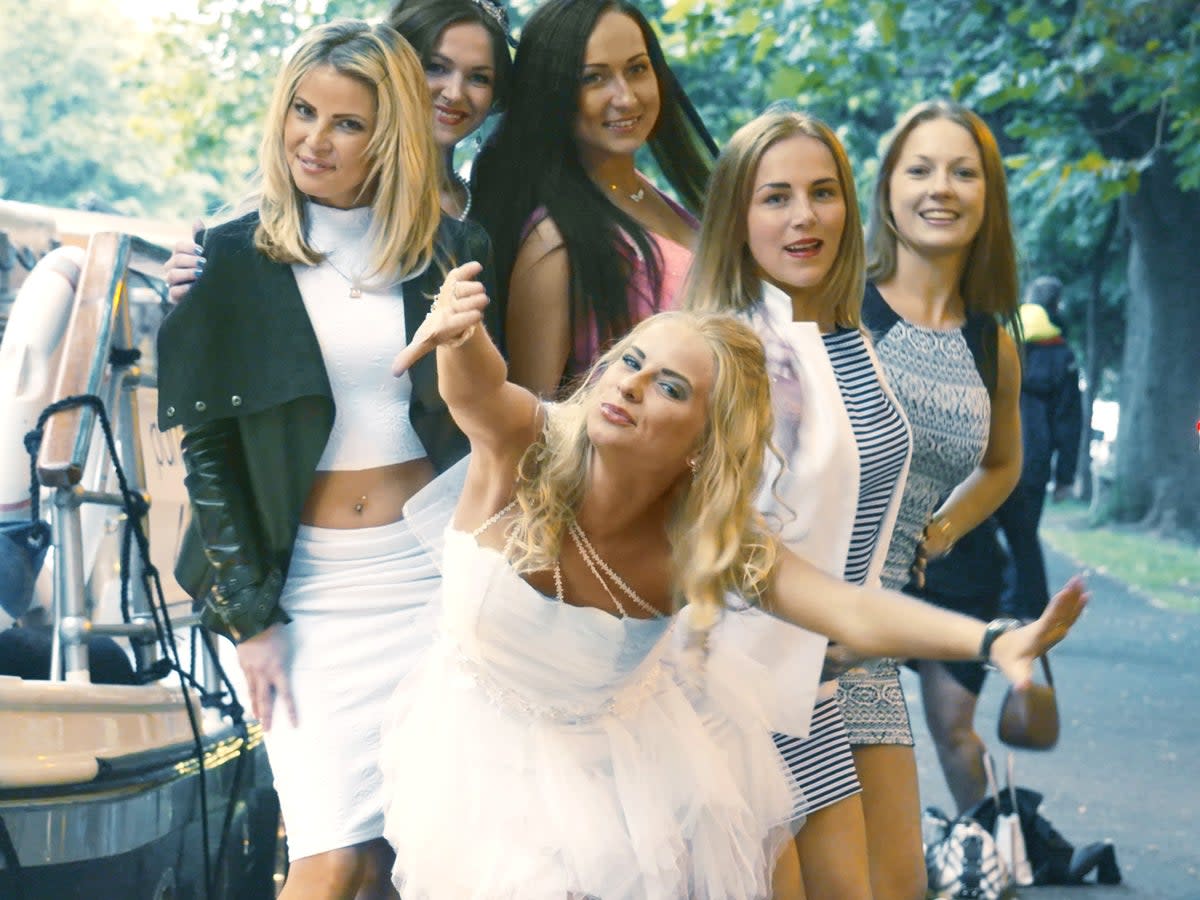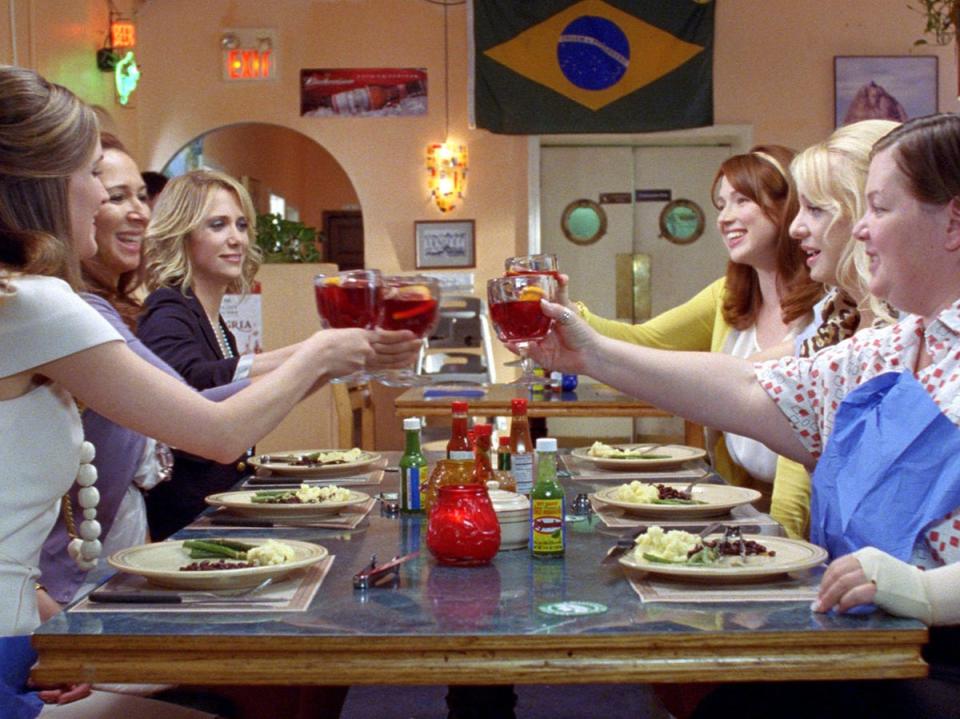Conflict, toxic group chats and organised fun: How we came to despise the hen do

Ping! A notification lights up your phone screen. The green WhatsApp logo is a portent of novelty sashes and intricate dress codes to come: you have been added to a group named “Clare’s Bride Tribe 2024”. As you take a moment to sneakily assess which other assorted female friends of the bride will be joining you on this odyssey, the opening salvo of messages lands, laden with emoji. “Hey lovely ladies! Can’t wait for us to show Clare the best weekend ever before our Miss becomes a Mrs!” her bridesmaid writes. Flamenco dancer. Champagne bottle. Diamond ring. Another flamenco dancer.
Your fate is sealed. Over the course of a three-day period some time next year (exact dates will be voted on via Doodle poll), you’ll be taking part in a packed itinerary designed to give the bride a good send-off. There will be masks of the groom’s grinning visage, printed out on someone’s office LaserJet and made demonic by the glaring eye cut-outs. There will be alcohol in colours that don’t occur naturally. But before all that, there will be months of chatter – and the occasional passive-aggressive remark – in the hen do WhatsApp group. Sound familiar?
When women hit a point in their late twenties, being thrown into a group chat consisting of a dozen or so girlies you may or may not have met tends to become an annual occurrence. It’s an inevitability of female friendship – although it inspires mixed feelings. For every hen excitedly spamming the rest with memes and in-jokes, there will probably be one who is sending screenshots elsewhere, accompanied by a digital eye-roll (sometimes the same hen is doing both at once – we contain multitudes).
In a recent survey from wedding website Hitched.co.uk, 56 per cent of their users conceded that these groups are good for communicating plans in the run-up. But as the site’s deputy editor Rima Barakeh puts it, “when it comes to the social side of them” – meaning bonding ahead of the main event – they were “a little more divided… A further 42 per cent of users said they like these groups for planning and getting to know one another, while just two per cent of respondents said they like to just chat”.
We all have our war stories. Disputes over money are common (no wonder – recent research from Aviva estimated that the average UK hen party will cost attendees around £625 each). “I’ve recently experienced someone starting a group chat with all attendees for a whole weekend do with a basic cost of £500 (without travel, food, or drink),” says Emma (I’ve changed some hens’ names so they’re not banished from their respective WhatsApp groups forever). “[It] makes it incredibly awkward for those of us saying we can’t afford it by saying how there’s plenty of time to save.” The flipside to a situation like this is when one vigilante becomes the Martin Lewis of the group, trampling over the bridesmaids’ best-laid plans. Susannah* recalls how one woman phoned up an afternoon tea venue, then told the rest of the hens that they could get a lower price by opting out of champagne. “I then had an influx of people opting for that and asking for their money back, only to then be billed by the venue for the original full set price,” she says.
Some are yet to extricate themselves more than a decade after the celebrations. “I’m still in one as I don’t want to upset the former bride,” admits former hen Sarah*. “But the hen do was 12 years ago and she still messages collectively [to say] ‘Hey hens!’’’ Others have tales that are the stuff of recurrent anxiety dreams. When Amanda Elias, founder of clothing personalisation company Uncie, was added to a hen do chat on Facebook, the price of the celebrations kept going up and up. She sent a frank message to her mother-in-law to complain. Or so she thought. “I text [her] saying something like, ‘I don’t want to spend that much money on stupid activities that I’m not interested in doing with people I don’t even know,’” she remembers. “Only… you guessed it, I text the group instead of her.” The chief bridesmaid wasn’t impressed. “I just said ‘I’m sorry it came out that way, I would have said the same thing to you, just a little more politely.’ She was furious apparently, and really insulted.”
The pre-hen WhatsApp chat might be a relatively recent phenomenon, but female ambivalence towards pre-wedding celebrations goes further back. Beth Montemurro is a professor of sociology, psychological and social sciences at Penn State University, Abington, and the author of Something Old, Something Bold: Bridal Showers and Bachelorette Parties. When she was working on the book in the 1990s and early 2000s, bachelorette parties (the American cousin of the hen do) “were newer – they were not part of the established wedding routine,” she explains, whereas the more formal, staid bridal shower was common.
That event tended to bear the brunt of women’s annoyances. “At that time, the women that I interviewed were dreading the bridal showers and looking forward to the bachelorette party,” Montemurro explains. “They talked about bridal showers as a ritual of obligation, as something that they felt was kind of boring and stilted and overly feminine.” The bachelorette, meanwhile, was framed as “an opportunity to do what men could do”, or behave in a way that “we’ve been discouraged from, or that hasn’t been part of what people expect of women”. But as time has gone on, Montemurro notes, bachelorettes and hen parties have become “more institutionalised” and therefore “more expected… If you grew up thinking that that’s just what you’re going to do [when your friends get married] then it doesn’t feel innovative.” Hence the hen becoming associated with regimented, organised fun. And nothing screams organised fun like a WhatsApp group laden with questionnaires.
I know hen do organisers get a lot of hate for the relentless messages, but my god, it’s a thankless task
Rachel England
The intricate social ecosystem of the hen do WhatsApp isn’t just a product of an age where we’re all instantly contactable – it’s also rooted in an increasingly more-is-more attitude to weddings and all the associated celebrations. The cost started to rise in the Seventies and Eighties, explains Helen Wood, professor of media and cultural studies at Lancaster University and co-editor of The Wedding Spectacle Across Contemporary Media and Culture; then it “accelerated into the Nineties and the Noughties”, when “the idea that the more glamorous your wedding looks, the more successful you are as a person” started to really take hold. A picture-perfect wedding, Wood says, became “a symbol in neoliberal cultures of having achieved, worked [hard], done the right stuff”.
This emphasis on the “spectacle” of the big day, she adds, has ironically intensified as marriage has become much less necessary for women “in terms of financial dependency” – “the more and more [weddings become] unnecessary for women to survive, the more and more pressure on the wedding as a symbol of success.”
And as nuptials become extravagant productions, so have the events that precede them – requiring painstaking organisation (read: more back and forth in the group chat). “In the Nineties, in the early 2000s, it might have been a night out – in this era, it can be a weekend,” Montemurro notes. “And then I’m sure there is also that feeling of frustration with the amount of time, especially if… there’s this elaborate conversation about it [in the group] beforehand. That makes sense, that there would be some frustration with that extra expense, the extra labour and the expectation that everybody should do it eagerly as well.”

That sense of expectation can weigh heavily. While we might begrudge the endless admin, we do all want the bride to have a good time. We might even feel guilty for any initial lack of enthusiasm. Perhaps that’s why we find ourselves echoing the endlessly upbeat, “hey gorgeous girlies!” pleasantries. Wood also notes that when something becomes “so ritualised, it makes it feel like a compulsion. What would it be to say, ‘I’m not going to take part in this ritual?’ That’s what plays into that tension – once you’ve ritualised something, then the pressure to be socially normal makes [challenging this] problematic”. She adds that, in a society obsessed with quantifying relationships, being invited to the hen (and being inducted into the accompanying digital chat thread) becomes “a measure of your friendship”. We join in because we want to prove how much we value the bride, and how much we are valued by her.
Over the years, I’ve become better at reminding my cynical self that even if that initial call-up to join the “bride tribe” might make me brace for impact, the intentions behind it are always good. The hen do WhatsApp says more about the over-inflated state of the modern wedding industry than it does about its individual participants. Behind every emoji-happy bridesmaid calling you a lovely lady, there is a very frazzled woman who just wants to be able to confirm 25 separate meal options with a bottomless brunch menu.
“I know hen do organisers get a lot of hate for the relentless messages, but my god, it’s a thankless task,” writer Rachel England says. “It’s exhausting and stressful because there’s always at least one person in the group who’s a complete pain in the ass and it’s up to you to smooth it all over among different factions of people who don’t necessarily know each other. So when you get a ‘Hey ladies!’ message and want to scream, just know there’s a person on the other end who’d much rather type ‘Please god, just respond.’”
Next time you get that notification, remember her words. Though I certainly won’t judge you if you immediately hit “mute”.


